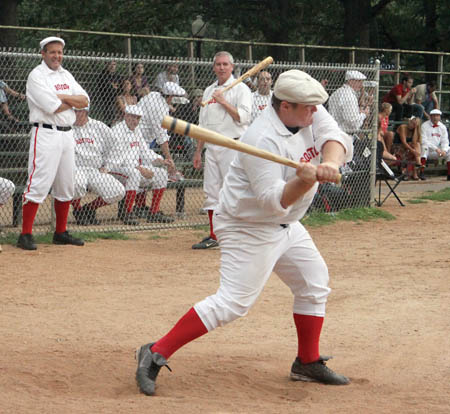August 18, 2011

They line up inside the dugout of the softball field on Boston Common usually reserved for Little League games – a dozen or so knickerbocker-ed men from the vintage Boston Red Stockings club, splitting sunflower seeds in between sips of Gatorade. The manager, “Orator” Jim O’Rourke, leans against the fence and fixes his bow tie. Deacon White is at the plate. A hit! “Hip-Hip Hoozah!” the players sing like choraliers.
It’s a Sunday afternoon and the Boston Red Stockings are beating their rivals from Cincinnati by two runs. Never mind that the Boston team was effectively dissolved more than 100 years ago, or that “Orator” O’Rourke died in 1919. As far as the players are concerned, it’s 1870 and the National League pennant might be at stake.
There was sparse news coverage of Boston’s Red Stockings’ vintage baseball game last weekend against the Cincinnati Red Stockings, and only a handful of spectators showed up along with the players’ families and a few curious dog-walkers.
The Boston Red Stockings vintage baseball club was recently incorporated by members of the Mudville Baseball Club in Holliston, Mass., to commemorate the historic team. “It’s like a living museum,” says John Shanahan, manager of the Mudville squad.
When playing games, team members assume the identities of the men on the original roster, says Shanahan, who plays the character of “Orator” O’Rourke. They play exhibition matches against other such vintage clubs using 1869 rules: no gloves, and fielders can tag out a batter who hits a foul ball, to name a couple.
Following Sunday’s game against Cincinnati, which Boston won, 9-6, the team gathered at the old George Wright home on Grampian Way in Savin Hill, accompanied by Wright’s great-grandson Denny Wright, the athletic director at the Dexter-Southfield School in Brookline.
The long-ago rivalry between the two vintage clubs is interwoven with the story of American baseball – a story that flows through Boston from Yawkey Way to Savin Hill, where the Stockings’ Hall-of-Famer and American sportsman George Wright spent the last years of his life.
Last year marked the 140th anniversary of the introduction of the Boston Red Stockings, who were brought to the Hub in 1870 by George Wright and his brother Harry. The team, originally the Cincinnati Red Stockings, was founded in 1867 as the first American professional baseball team.
As time went by, the Red Stockings morphed into the Boston Braves, who represented the National League in the Puritans’ city until 1953 when the team was relocated to Milwaukee and then, in 1966, to Atlanta.
The Wright family, however, remained in Boston and, much as Ohio’s Wright brothers were doing for the airplane, helped send America’s sports scene into flight.
Born in Yonkers, New York, George and Harry Wright were early players across America’s fledgling baseball landscape. After moving his team to Boston, George took up numerous off-field ventures, earning credit for his roles in the introduction of the baseball glove, the design of the knickerbocker-style baseball uniforms, and the popularity of baseball cards.
“He really developed baseball in ways that not many people know,” says Peter McNamara, trustee of the Savin Hill Historical Society and unofficial George Wright historian. “But everything that he did was centered around making money for himself and his team. He was really a businessman.”
Following a playing career as a shortstop with the Boston Red Stockings and, later, the Providence Grays, Wright opened the Wright and Ditson Sporting Goods store on Washington Street in downtown Boston which he operated until his death in 1937. He was one of the few in the Boston area who sold golf clubs, and as such he played an instrumental role in the developing popularity of the game in the first half of the 20th century. For one thing, he gave employment to Francis Ouimet, a Brookline boy who made history in winning the U.S. Open in 1913 in a playoff against British golfing legends Harry Vardon and Ted Ray at the Boston Brahmin temple of sports known as The Country Club.
Today, the George Wright Golf Course in Hyde Park bares his name.
According to McNamara, who occupies the house on Savin Hill’s Grampian Way adjacent to the old Wright residence, George might have been the first purveyor of baseball cards when he distributed wallet-sized pictures of the team’s players with advertisements on the back to raise revenue. A Cincinnati woman recently recovered one of Wright’s original players cards in her attic and sold it for $80,000 at an auction.
“It’s amazing to see so many people with an interest in my family history,” said Denny Wright after the game. “This is a great moment.”
Villages:


